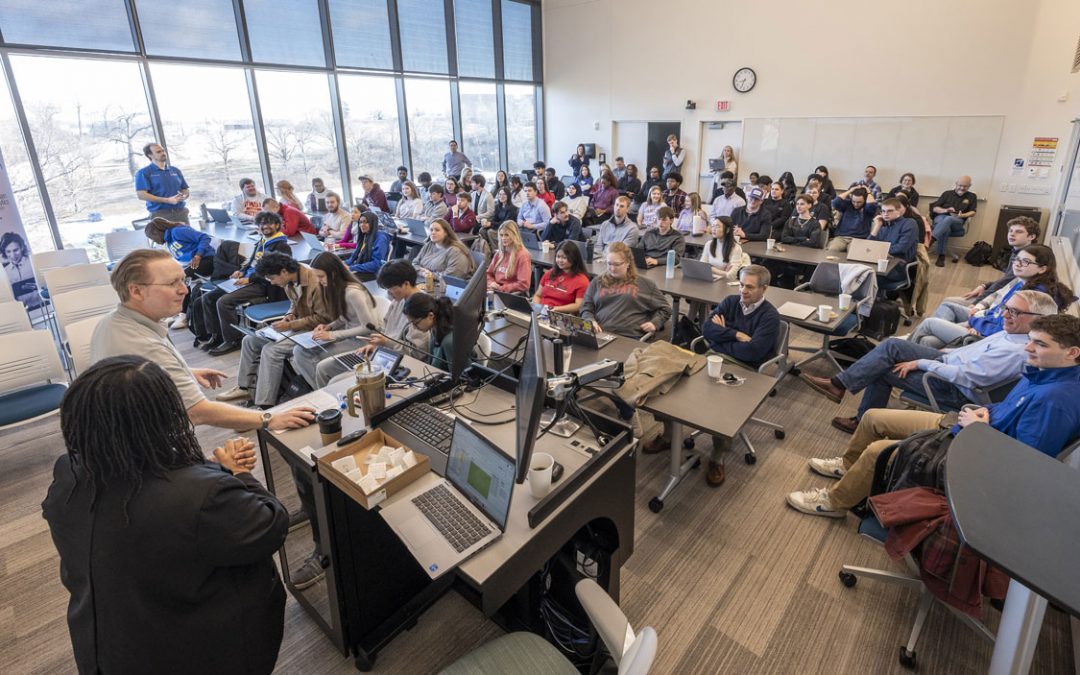
UMSL’s commitment to developing quality online course design and course delivery is a big reason the university was ranked No. 1 on the Forbes list of Best Online Colleges in Missouri. (Photo by Derik Holtmann)
Olivia Mendez-Alm and her team at the University of Missouri–St. Louis Office of Admissions share a fun little tradition. Whenever a new student is accepted to enroll for online classes, the goal is to connect with that student on the phone before the acceptance email arrives.
“We call them,” said Mendez-Alm, director of enrollment services at UMSL, “and we say, ‘Congratulations, you’re admitted! We’re so excited to have you as part of our family. How can we get you onboarded?’”
For Mendez-Alm and her colleagues, it’s their way of showing that even UMSL’s online education program has a personal touch, and it’s an early indication of UMSL’s dedication to providing a thorough, quality experience all the way from acceptance to graduation.
“UMSL is committed to online education because we’re committed to transforming lives, and we know that online education is a way that makes education accessible to students who otherwise may not have it,” Mendez-Alm said. “At UMSL, they know they’re connected to a solid institution, part of a solid system of higher education.”
The students aren’t the only ones who recognize what UMSL offers.
Earlier this month, Forbes released its 2024 ranking of the Best Online Colleges in Missouri, evaluating a pool of 22 public, private and online colleges in the state using 17 data points including student outcomes, affordability, student experience, credibility and application process.
When the numbers were crunched, UMSL emerged with the No. 1 ranking.
“I feel extreme pride, not just for our institution, but as a recognition for the amazing dedication of our faculty, who day-in and day-out are truly so committed to our students and to excellence in what they do,” said Keeta Holmes, the assistant vice provost for academic innovation and director of the Center for Teaching and Learning. “Often, awards are realized by one person earning an award, and that doesn’t recognize or reflect the hundreds of amazing other colleagues who are just as deserving. This is a shared honor for all of us.”
Rounding out the Forbes top 10, in order, were Maryville University, Avila University, University of Missouri-Columbia, University of Missouri-Kansas City, Missouri State University, William Woods University, Park University, Lindenwood University and Northwest Missouri State University.
Here’s a bit of what the Forbes article said about UMSL:
The University of Missouri-St. Louis (UMSL) features 20 online bachelor’s programs, plus accelerated and pre-professional programs. Many programs run entirely online with asynchronous classes in four-, eight-, 12- or 16-week sessions. You can also find hybrid and evening classes. UMSL awards millions of dollars in financial awards each year, including merit scholarships for freshman and nonresident students and competitive and transfer student scholarships.
For Mendez-Alm, her passion has always been advocating for underserved students, which is one of the many reasons she enjoys her position. In addition to adult students – anyone over 24 years old – she handles enrollment for any student seeking an online-only schedule as well as workforce partnerships, with groups such as the St. Louis Metropolitan Police Department and Worldwide Technologies.
It’s her job to make sure new students understand everything UMSL offers, including student support services such as tutoring, advising, academic and career coaching. Mendez-Alm also notes that online-only students have the same access to the campus facilities as any student, including the library and Recreation and Wellness Center.
And above all, she wants students to feel comfortable and confident.
“When you’re hanging up with a student, we don’t say, ‘Do you have any questions?’” she said. “We say, ‘What other questions do you have?’ We assume they have questions because everybody has questions, and they shouldn’t feel shame for having additional questions. That’s part of the onboarding mentality of my team.”
The Forbes ranking is a reflection of UMSL’s online educational opportunities for 2024, but to understand why the university is in that top spot now, it’s essential to step back and understand how the solid foundation of UMSL’s online ecosystem was created.
Holmes and her Center for Teaching and Learning colleagues developed the 5 Pillars of online course design in 2014, and those were approved by UMSL’s deans and provost. Those pillars have since been adopted by the other UM System schools.
Every online course at UMSL is not only created using those pillars as the guiding principles, but reviewed by a group of faculty members trained as a peer review corps to ensure that online courses meet these high-quality assurance standards.
Another key element, Holmes said, is distinguishing between course design and course delivery. In-depth training sessions ensure faculty members understand the best methods to deliver the courses in ways that encourage student learning. Between 2012 and 2019, Holmes said more than 500 UMSL faculty members went through CTL’s online course development programming.
Because of that thorough and multi-faceted foundation of preparation, UMSL was able to quickly pivot when the COVID-19 pandemic hit in the spring of 2020. Though the in-person spring classes that were finished online were classified as remote emergency learning, not true online classes, many faculty were prepared on the principles for delivering a quality online experience. When classes went fully online starting that summer, UMSL was ready to rely on the deep repository of quality reviewed online courses to build its schedule.
“We have cultivated a great trust between the CTL and the faculty,” Holmes said. “They know when they come to us that we are supporting them, that we want the best for them, and we’re not just pouring on work. It is a collaborative partnership. I think that also helped us weather that COVID storm. There were many news stories coming out about other institutions, not just in Missouri but nationally, where faculty didn’t feel as prepared when that storm hit. I remember some of our faculty stepping up to help their colleagues and even being quoted in various news stories about how supported and ready they were when we pivoted to online. I was just so thankful that they felt that way.”
One of the keys to success – before, during and after the pandemic – is that the guiding principles allow for both course design and course delivery to be adjusted to fit the individual faculty member’s strengths and style of teaching.
“There are a variety of interactive tools faculty can choose from,” Holmes said. “In those early COVID days, it was too much for faculty to learn the entire technology toolbox available. Missouri Online and the CTL held workshops and many individual consultations to hear what the faculty wanted to do, and then we would recommend a toolbox for that class that would accomplish what they need. We can say, ‘Okay, here’s the magic mix of what you need to challenge students, but in a way that they feel supported and feels realistic.’”
Holmes said her group has used lessons learned during the pandemic to strengthen that foundation. For example, they’ve infused an important component of resiliency into course design to allow for handling unexpected interruptions in any course, whether that’s due to illnesses or any other situation.
For Holmes and Mendez-Alm and so many others, the Forbes ranking is the result of a years-long collaborative effort, all the way from staff to faculty and the students themselves.
“They’re pouring their soul into these courses, and it’s such a wonderful thing to see this effort recognized,” Holmes said. “I know the volume of invisible labor that was needed to produce such excellence in these online classes. Our faculty are amazing. I also am amazed by the commitment of our students to engage in our online classes and seek out these opportunities. I think it is a testament to the quality of our students and the way our online classes have created access to learning for them.”














